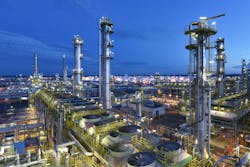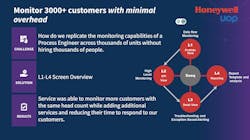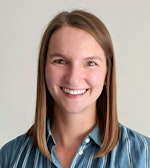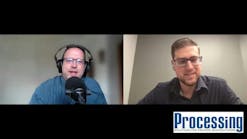The word “sustainability” has become as mainstream in business conversations as words like “productivity,” “profit” and “growth.” The repeated use of the word invites us to consider its history, and how it has changed meaning both over time, and in the context of the scenario applied.
In chemical manufacturing, the connotation is often tied to environmental or carbon impact, being linked to reductions in emissions, resource consumption and waste. But it can also be used to describe solutions with longevity. The story of Honeywell UOP’s implementation of Seeq explores both interpretations of the word, and how each plays a critical role in the chemical industry's future.
From “sustain” to “sustainability”
At the root of sustainability is the verb sustain, from the Latin sustinere meaning “hold up, furnish with means of support; bear, undergo, endure.”1 Add the suffix -able and the meaning of the resultant adjective leans enduring, as being “capable of being continued,” in the case of sustainable growth.2 Compound suffixes with “-ity” and you get a noun describing the “condition or quality of…” being capable of being continued.3
The first references to the word sustainability date back to the 18th century when a German word translating to “sustained yield” described responsible agricultural practices.4 This definition persisted until the late 20th century, when in 1987, the World Commission on Environment and Development stated that “sustainable development is development that meets the needs of the present without compromising the ability of future generations to meet their own needs.”5 This near 40-year-old definition provided the basis for what is now described as the “triple bottom line” of people, profits and the planet.
Examining the sustainability pledges made by chemical industry leaders turns up an almost exclusive emphasis on the planet portion of this triad. This is not without reason, as the industry accounts for around 2% of global emissions.6 But the efficiency segment of sustainability must not be overlooked.
The industry is certainly familiar with operational excellence initiatives. For example, improvement projects to unlock capacity, optimize maintenance procedures and increase quality capability are all levers for moving the needle on profitability. These sorts of projects can generally be grouped into two categories: those that require capital investment and physical plant modifications to debottleneck, and those that make operational or procedural adaptations based on uncovered inefficiencies. The latter, lower-cost, efficiency projects — which describe the following case study — are often geared toward more effective utilization of raw materials or energy inputs to a process, as well as reducing waste.
Today, engineers still identify and implement these latter opportunities in a similar fashion. However, the accounting and means of assigning priority to these efforts versus more capital-intensive projects have changed.
Honeywell UOP combines green tech development with engineering services, providing solutions with longevity
Honeywell UOP has a long history in the petrochemical and refining industries as a product innovator, a manufacturer and a technology licensor. With over 3,000 installations of licensed process technology and more than 6,000 units leveraging the company’s catalyst and absorbent technology, its biggest challenge is implementing solutions that both scale and endure. Each of these technology and product installations generates an exorbitant amount of data, which Honeywell UOP intends to use to help customers operate more reliably and efficiently.
Moving from data to solution with over 3,000 customers is a herculean task. The company needed a way to deploy monitoring solutions to its customers quickly, correctly and without needlessly bloating the existing employee base. Furthermore, the solutions provided must be intuitive and usable out of the box, without guided training on additional tools or platforms.
Honeywell UOP’s solution used the Seeq API to push data, analytics and templates for its suite of connected solutions out to all its customers, providing a reliable and consistent deployment with minimal incremental effort. The small but mighty team within Honeywell UOP responsible for this push expects to deploy 9,000 monitoring screens to the company’s customers in its first year of launch.
The team designs its solutions with layers of views (Figure 1) so different personas among customers using the screens can visualize a level of detail appropriate for their needs. The top level provides a view of overall system health, showing data connectivity and engine calculation status. The layers below dive deeper into troubleshooting for specific process units, and they leverage the medical-industry-coined “triage” process to focus user attention on the processes requiring the most urgent attention.
Leveraging the single data access point provided by Seeq empowered Honeywell UOP to move from over 1,000 Excel-based plug-ins to a single ecosystem of templatized troubleshooting tools, templatized data review and analysis, and automated reporting. The company estimated this shift from disparate point solutions to a centralized platform has provided $1.5M in efficiency gains.
Two definitions intertwined
In its efforts, Honeywell UOP is providing lasting solutions to challenges related to operational efficiency and greener operations. Each incremental gain in efficiency provides the opportunity to reduce energy and natural resource consumption, lower carbon emissions and reduce waste, while increasing profitability and business longevity.
Operational efficiency improvements are not merely short-term gains, but also long-term strategies for shifting to more responsible means of production. By chipping away at inefficiencies both large and small, chemical manufacturers are making real progress toward their operational and sustainability pledges, improving the outlook for people, profits and the planet.
Katie Pintar is a senior analytics engineer at Seeq Corporation, where she helps companies maximize value from their data. She has a process engineering background with a B.S. in chemical engineering from Montana State University. Katie has over five years of experience working for chemical manufacturers to optimize existing processes and develop processes for new materials, scaling them from the lab to pilot plant to full-scale manufacturing. She has expertise in batch and continuous processing for a wide range of chemistries.
Chad Bjorklund has a degree in computer engineering from Purdue University and has been working in the oil and gas industry for the past 20 years with Honeywell UOP. He began his career in automation, programming complex control systems for a variety of refining and petrochemical process units. Chad spent 5 years on the road commissioning systems around the world and another 5 years leading the Hydrogen Automation and Service groups. As Honeywell began the transition from the Dow to NASDAQ, he moved into a new division focused on developing connected solutions. Chad spent several years developing and deploying “connected” offerings, leveraging streaming analytics and embedding a century’s worth of Honeywell UOP knowledge and IP. Currently, he has transitioned into the world of IT, developing and supporting the infrastructure around those connected offerings. Chad collaborates with the business and content developers to ensure they have the tools and platform in place to meet the needs of both internal users and external solutions.
Louis Lattanzio is the digital innovation and implementation leader in the Performance Services business at Honeywell UOP and is responsible for coordinating new digital offerings activities for the UOP Lifecycle Solutions & Technologies business. During his 21 years with UOP, Louis has held several positions in Technical Services, Field Operating Services, Catalyst Manufacturing, Pilot Plant Operations, and Engineering. Before his current role, Louis was the Connected Solutions Technical Services Coordinator, where he helped coordinate development activities between UOP domain experts and developers to create connected solutions on core UOP technologies. Louis earned a B.S. in Chemical Engineering from the University of Illinois at Chicago.
1 https://www.etymonline.com/word/sustain
2 https://www.etymonline.com/word/sustainability
3 https://www.etymonline.com/word/-ity
5 https://news.fit.edu/science/sustainability/
6 https://www.mckinsey.com/industries/chemicals/our-insights/decarbonizing-the-chemical-industry




